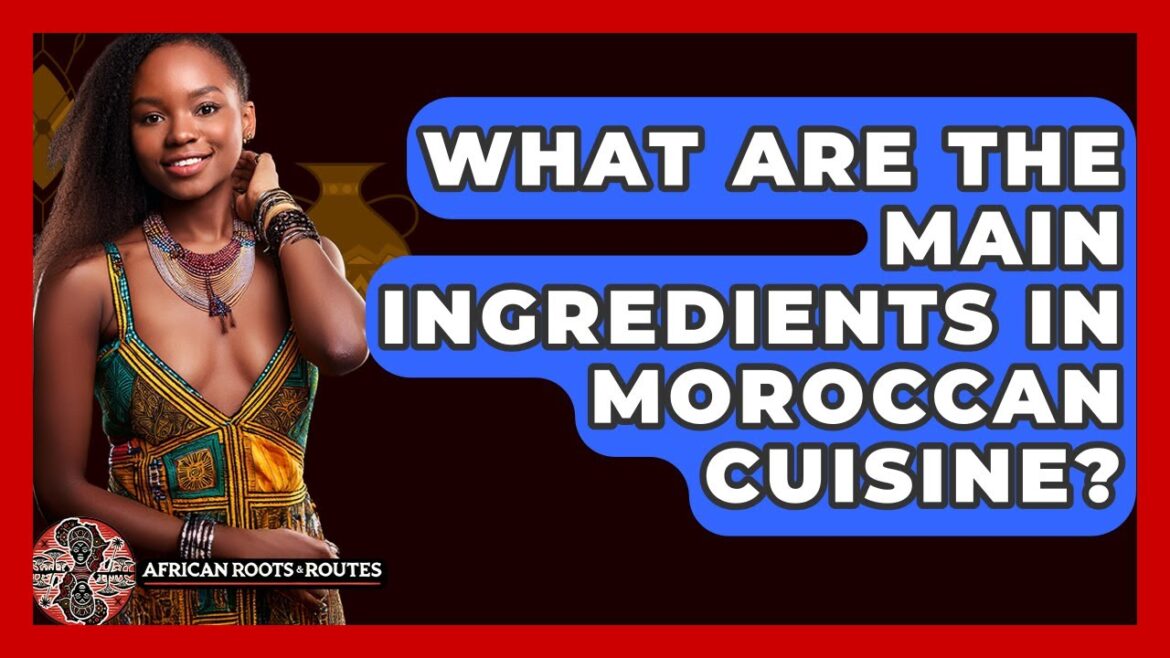What Are The Main Ingredients In Moroccan Cuisine? In this captivating video, we will take you on a journey through the delightful world of Moroccan cuisine. Discover the essential ingredients that contribute to the unique flavors and aromas that define this incredible culinary tradition. From aromatic spices to fresh herbs, we will highlight the key components that make Moroccan dishes so beloved around the globe.
Learn about the role of preserved lemons and olives in adding depth to stews, as well as the significance of couscous and various grains in traditional meals. We will also cover the importance of proteins, including chicken, lamb, and seafood, and how they are prepared to perfection in tagines. Fresh vegetables and dried fruits play a vital role, bringing a balance of sweetness and savoriness to the table.
Additionally, we will explore the oils and fats that are commonly used, such as olive oil and argan oil, and how they enhance the overall taste of dishes. Flavor enhancers like honey and orange blossom water will also be discussed, revealing their impact on both savory and sweet recipes.
Join us for this engaging exploration of Moroccan culinary traditions, and don’t forget to subscribe to our channel for more exciting content about Africa’s rich cultures and cuisines!
⬇️ Subscribe to our channel for more valuable insights.
🔗Subscribe: https://www.youtube.com/@AfricanRootsandRoutes/?sub_confirmation=1
#MoroccanCuisine #FoodCulture #CulinaryTraditions #Spices #FreshHerbs #Couscous #Tagine #MediterraneanFood #Cooking #HealthyEating #FoodLovers #AfricanFood #Gourmet #HomeCooking #FlavorfulFood
About Us: Welcome to African Roots and Routes, your go-to destination for exploring the rich tapestry of Africa’s culture, history, and landscapes. Our channel is dedicated to uncovering the diverse stories and traditions that shape the African continent, from ancient civilizations to contemporary movements.
What are the main ingredients in Moroccan cuisine? When you think of Moroccan cuisine, what comes to mind? The vibrant colors, the tantalizing aromomas, and the rich flavors all tell a story of a culture that has blended influences from Africa and the Mediterranean. So, what are the main ingredients that make Moroccan dishes so special? Let’s take a closer look. First, spices play a starring role in Moroccan cooking. One of the most famous blends is called ras elhanude, which can include a variety of spices like cumin, coriander, cinnamon, and turmeric. This mix is essential for seasoning to jeans and stews, giving them that warm complex flavor. Individual spices such as ginger and saffron are also commonly used, adding depth to many dishes. Next, fresh herbs are a must-have in Moroccan kitchens. You will often find cilantro, parsley, and mint brightening up meals. These herbs not only enhance the taste, but also balance the richness of the spices. They are frequently used in marinades and salads, and of course, in the beloved Moroccan mint tea. Another key ingredient is preserved lemons. These tangy fermented lemons add a unique citrus flavor to tjines and stews. They are often paired with olives which can be green or black providing a salty contrast that compliments many dishes. When it comes to grains, couscous is a staple in Moroccan cuisine. Made from semolina wheat, it is often served alongside vegetables and meat stews. Semolina flour is also used to make various breads such as misemen, a flaky flatbread, and cobs dar, the traditional house bread. Barley and other grains can also be found in regional recipes. Proteins are another important component. You will commonly see chicken, lamb, and seafood, especially in coastal areas. These proteins are often slowcooked in tjines or grilled with spice rubs. Legumes like chickpeas are also popular, frequently appearing in soups and stews. Fresh vegetables are abundant in Moroccan dishes. Eggplants, tomatoes, carrots, potatoes, and peppers are widely used. Dried fruits like dates, raisins, and apricots are often added to savory dishes, bringing a touch of sweetness that enhances the overall flavor. Oils and fats are essential for cooking as well. Olive oil is the primary choice known for its flavor and health benefits. Argan oil, which is native to Morocco, is also used in cooking and as a finishing touch for dishes. Smen, a type of fermented clarified butter, adds a distinctive aroma to some traditional recipes. Finally, flavor enhancers like honey and orange blossom water are often used in desserts and occasionally in savory dishes. Garlic and onions from the aromatic base for many recipes, adding richness and depth. Together, these ingredients create the vibrant flavors that Moroccan cuisine is known for. The combination of spices, preserved lemons, fresh herbs, and a balance of sweet and savory elements reflects Morocco’s culinary heritage within the broader African context. Cooking techniques like slow cooking in tines and grilling help bring out the full potential of these ingredients, making every meal a celebration of flavor and tradition.

